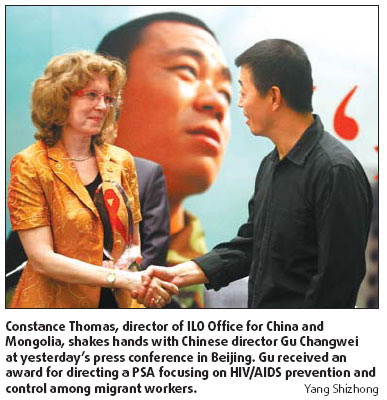
|
CHINA> National
 |
|
AIDS campaign pays off in spades
By Shan Juan (China Daily)
Updated: 2009-08-04 07:34
 Lectures on AIDS prevention would not normally be a good draw for migrant workers, but a pilot project in three southern provinces has been pulling full houses. That's because the organizers are handing out free decks of poker cards with AIDS/HIV information printed on the card faces. "We're trying to find the right way to appeal to migrant workers," said Zheng Dongliang with the Ministry of Human Resources and Social Security. The awareness campaign targeting migrant workers, which also attracts audiences with free bread and water, has paid off with increasing condom use and reducing high-risk behavior. About 73 percent of migrant workers said they used condoms, according to a recent survey by the International Labor Organization (ILO). That's a dramatic rise from the 49 percent who gave the same answers during a survey in 2007. The three-year campaign, launched in 2007 by ILO and the Ministry of Human Resources and Social Security, aims to reduce HIV/AIDS risk behaviors and discrimination and improve uptake of HIV-related health services like free counseling and treatment among the country's 200 million migrant workers.
The high frequency of paid sex and low use of condoms has been constantly found among migrant workers who leave their hometowns and spouses for better job opportunities in cities, experts say. "They are therefore at greater risk of HIV/AIDS themselves and more likely to spread the virus around, from city to countryside by sex with spouses at home and from one city to another by commercial sex," said Howard. Twenty-seven percent of migrant workers polled said they visited prostitutes, a drop from 35 percent in 2007. Of greater concern, about 19 percent of them had been found to have at least one kind of sexually transmitted disease (STD). The national STD incidence remains about 0.05 percent, official figures show. "The high STD prevalence among migrant worker shows that compared with the general public they are more involved in the high-risk behaviors which may lead to HIV/AIDS infection," Wu Rulin, Program Officer with IOL told China Daily yesterday. Given the great mobility of migrant workers, controlling HIV/AIDS among them is crucial to the national war against the virus, Qiu Renzong, bioethicist at the Chinese Academy of Social Sciences told China Daily yesterday. For that, government and society need to do more in resources allocation and attitude change, he said. |